

Yet again, education has become an election issue and a topic that the majority of candidates have put high up on their manifestos - but how did we get to where we are now?
The States first agreed to scrap the 11+ in March 2016 but, as the island approaches its second general election since then, little progress has been made in committing to a new secondary school system.
The current States Assembly was voted in in April 2016 and, just a few months later, the selection debate returned to the floor. Once again, States Members voted to get rid of selection, with 21 votes to 19.
Education, Sport & Culture - which was headed up by Deputy Paul Le Pelley at the time - then got to work planning what the new secondary school system should look like.
His committee went to the Assembly in January 2018, proposing a three-school model. The main sticking point was their post-16 offering, which was widely dismissed by the professionals as "inoperable".
The so-called 'Gang of Four' - made up of Deputies Matt Fallaize, Rhian Tooley, Mark Dorey and Richard Graham lodged an amendment - asking for two 11-18 schools instead. The amendment was successful, with 28 votes to 13.
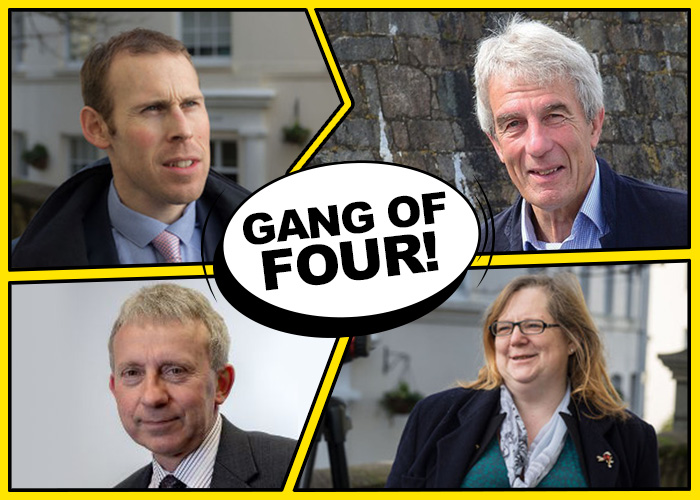
Pictured: The 'Gang of Four' brought the successful two-school amendment.
Following the defeat of their model, members of the education committee decided to resign from their positions, leaving them up for grabs.
Deputy Fallaize was elected President of ESC, while the rest of the 'gang' secured places, along with Deputy Peter Roffey.
The last pupils to sit the 11+ did so in early 2018 and the selective process was consigned to Guernsey history.
The newly-elected committee began working on a detailed plan for their proposed two-school model, which was eventually brought to the States in July 2019, after some delays.
A 132-page document set out the plans for two 11-18 schools, with a separate post-16 offering at Les Ozouets. It was expected to come in cheaper than previously thought, at around £157m.
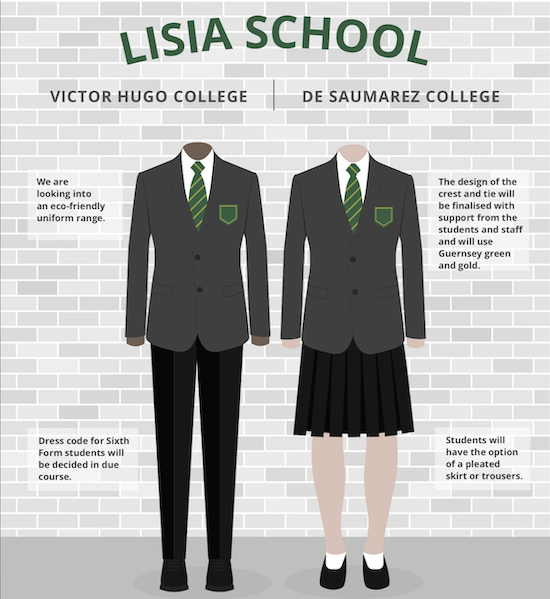
Pictured: A uniform for the new Lisia School was decided upon and publicised by the States.
In the weeks following, a thread of emails were revealed, in which Deputy Fallaize threatened to resign after civil servant colleagues who sat on an interview panel didn't vote for his preferred candidate for the role of Head of Curriculum & Standards. Days later, the successful candidate - a local headteacher - withdrew from the recruitment process having originally accepted the position on the same day it was offered to them.
Despite calls for his resignation, the President of ESC decided not to step down from his role, with plans to see his committee's proposals through the States.
However, Deputies Carl Meerveld, Andrea Dudley-Owen, Rob Prow and Barry Paint asked that the debate on the two-school model be put off, until Education could release more detail on its plans.
Following that, three teaching unions raised concerns about the model and what it would mean for secondary school pupils.
Education still went out to tenders to find construction firms willing to carry out the building work for the two 11-18 colleges, which was due to start in 2020. But that wasn't to be.
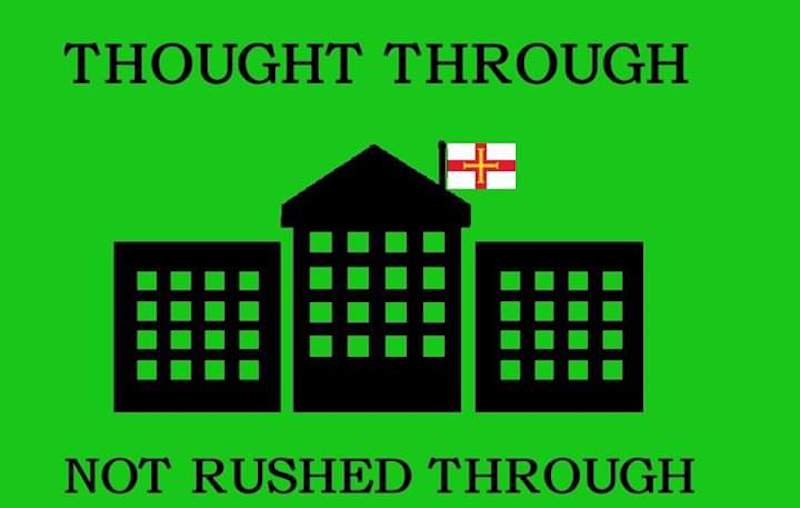
Pictured: An online petition was set up against the two-school proposals.
An online petition was set up, calling for the model to be delayed further and "thought through, not rushed through". It was signed by thousands of local residents, many of whom took to the seafront in January this year to publicly oppose ESC's plans.
In the meantime, Deputies Meerveld, Dudley-Owen and Prow laid a requete, calling for a 'pause and review'.
Members of the previous ESC Committee, Deputies Le Pelley and David De Lisle attempted to bring back the three-school model, but it once again failed to gain States support.
In March this year, after one of the longest debates in States history, deputies decided to 'pause and review' the education reforms, with 18 votes to 17 and one abstention.
The requete ordered ESC to draw up comprehensive comparisons between the two-school model and other potential models, and report back to the Assembly.
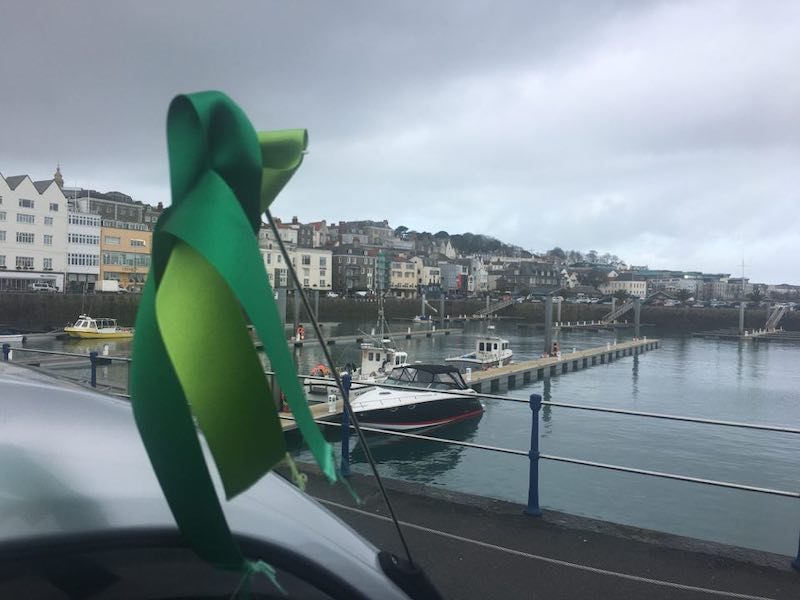
Pictured: Some chose to support the requete by wearing green ribbons.
The current committee members all decided to stay on in their roles following the requete's success, and have since been developing three alternatives to their proposed model, to be use as like-for-like comparisons. Despite the pandemic, the review is set to be complete by the April 2021 deadline.
"The reason why the future model is not yet resolved is because there is no single model which commands a majority either within the general public or amongst educationalists," explained outgoing deputy and member of ESC, Richard Graham. "There may be a model which commands more support than any other single model, but there will not be a model which has more than 50% support."
Former Education Minister, Robert Sillars, said he was "shocked" when the two-school model was voted in and hopes the next committee will settle the issue as soon as possible.
"My board wanted the four-school model, but I accepted that probably wouldn't happen, so I was in favour of the three-school model with one sixth form," he said. "I was quite shocked when the one-school-over-two-sites model came about, which I am against. I went on the march.

Pictured: Mr Sillars is concerned the selection debate may return again.
"We'll see what happens in the election and we'll see what the report says. But I believe the three-school, smaller school model is the right way forward for Guernsey, for our culture."
Mr Sillars was keen to get rid of selection during his time on Education, but is still concerned that the debate might return to the Assembly once again.
"From the people I talk to, most seem to have got beyond that, but I have no idea who's going to get elected, especially education-wise," he added. "It's the right of every new States to review what's passed, but I hope they will get on so the children and the parents and the teachers aren't in a state of limbo.
"Until we confirm the way forward, we can't galvanise everybody and come up with a good education system."
Meanwhile, former Chief Secretary to Education, Jon Buckland, thinks there are some "key lessons" for the next committee to learn.
"There has been some progress in education in recent years but undoubtedly more could have been achieved," he said.
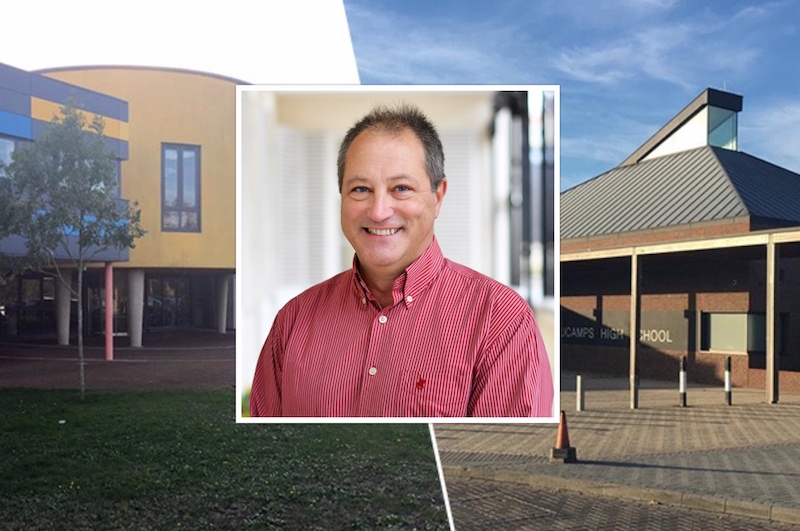
Pictured: Jon Buckland would have liked to see more progress in education over recent years.
"As an outside observer, there are a few key lessons. It is easy to underestimate how emotive education is as an issue for the public and it is easy for government to believe it exists in a bubble. Hence in this policy area it is so important to work with the community and engage with the young people, parents, carers and teachers.
"Simply having a mandate from the States is a necessary but not sufficient condition to move forward - make a compelling case for change and listen to the people. If it isn't accepted then you haven't made a compelling case. Selection is now in the past and anyone who is hoping it can come back hasn't been paying attention.
"Second, and this applies to government in general, lead with compassion and debate the issues not the people. I don't think we are interested in personality politics. I want politicians to focus on the policy issues - things that matter to us. We have seen so much energy expended and misdirected effort in negative campaigning and personal attacks when instead we need servant-leaders. The Civil Contingencies Authority achieved outcomes which the States of Deliberation would never have been able to deliver.
"And a final observation; we need proper governance too. Committees are obliged to consult with the public and stakeholders in preparing policy letters. And yet we see repeatedly amendments from the floor of the Assembly without any public engagement, analysis and proper scrutiny - it is often policy on the hoof. Just cut it out and reach consensus behind the scenes."

Pictured: The NCTLG said education was being used as a "political football".
A spokesperson for the NCTLG - the umbrella group of unions that represent all teachers, lecturers and support staff in Guernsey - referred to education as a "political football".
"Most teachers warmly welcomed the removal of selection at 11," they explained. "Since then, progress has been limited by the consequences of change in the political and senior staff personnel at Education, Sport & Culture. Whilst work continues behind the scenes, progress is hampered by secondary education remaining something of a political football as candidates in the forthcoming election jockey for advantage during the 'pause and review' period."
To read the NCTLG's response in full, click HERE.
Comments
Comments on this story express the views of the commentator only, not Bailiwick Publishing. We are unable to guarantee the accuracy of any of those comments.